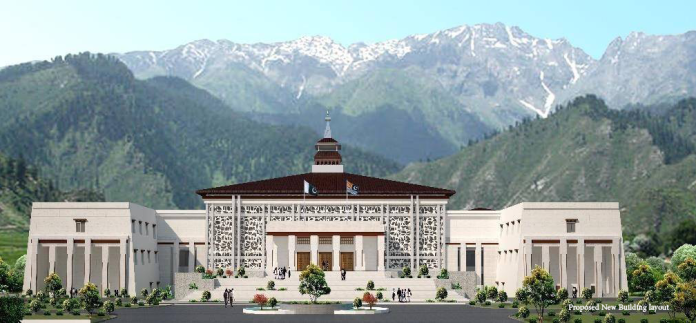Muzaffarabad, August 07, 2023 -The proposed Azad Jammu and Kashmir (AJK) Right to Information (RTI) Bill, is still pending, restricting journalists in AJK facing significant challenges in accessing information from government entities and officials to keep the public informed.
Journalists experience difficulties acquiring credible information in region without RTI Law, as it limits their access to legal documents and records. In order to provide reliable news reporting, they rely on alternative approaches that include developing confidential sources, and data analysis while adhering to ethical principles.
Section officer Law Department, Khawaja Hashim Shaheen has stated that on 3 Dec, 2021 they have submitted a formal request to the AJK Legislative Assembly to include “The Azad Jammu and Kashmir Right to Information Act 2021” on the agenda of the upcoming session. Along with the bill, the committee has also included the motions required for its presentation but has not received any consideration from legislators yet.
“Not only is the right to information bill but several other laws waiting owing to political instability and the government’s lack of interest. The delay in adopting these measures is causing problems for many sectors and slowing down progress in governance and transparency,” He asserted.
The Centre for Peace and Development Initiatives (CPDI) recently conveyed its analysis and suggestions on the proposed AJK Right to Information Bill, 2023 to the Prime Minister of AJK, Ch. Anwar Ul Haq.
CPDI uncovered multiple flaws and omissions in the bill that must be addressed in order to guarantee compliance with national and international best practices, along with the stipulations of Article 4, sub-Article (4) of the AJK Interim Constitution. This states that “Every citizen shall have the right to access information in all matters of public interest subject to regulation and reasonable restrictions imposed by law.”
CPDI emphasizes the need of enabling the authorities to teach officials about their obligations and raising awareness of the right to information. CPDI remains confident that these key recommendations would strengthen the draft bill, resulting in enhanced access to information in AJK and, eventually, increasing accountability and transparency in the territory.
On June 24-2023 (AJK) Prime Minister Chaudhry Anwar ul Haq underlined his commitment to transparency and responsibility during a discussion with the Central Press Club team led by its president Wahid Iqbal butt, echoing a recent report in The News International newspaper.
As reported by The News International earlier, In terms of the right to information, he stated that everyone has the right to request access to information held by the government or public authorities. “If the media wants any sort of information from any department of the state, the heads of the departments are bound to ensure the process of access to the information”, he said.
Sardar Zia Ul Qamar, the Minister of Pakistan People’s Party (PPP) LA-15 Bagh-II, shared, “There is no full-fledged presence of any single party in the current AJK government.” We have representatives from PPP, PTI, and PML-N. However, once a single party wins a majority administration, the prospects for adopting the RTI law in Azad Kashmir may improve.”
Quratulain Shabir, Information Officer at the Information Department AJK revealed that, in December 2019, they held an awareness Seminar about the Right to Information Act. They also took the proactive step of passing the RTI draft to the appropriate authorities. However, due to a change in government, the process has encountered delays.
On the other hand, The Azad Jammu and Kashmir High Court’s Mirpur Circuit has accepted a writ suit calling for the enactment of the Right to Information in Azad Kashmir. The petition has been admitted for regular hearing by Justice Sardar Ejaz Khan, who is supervising the matter
The petition, titled “Zafar Mughal etc. vs. Azad Govt. and others,” requests that the government and Legislative Assembly pass the Right to Information Act and establish an Information Commission/Tribunal with related appointments in government institutions.
During the conversation with, Zafar Mughal a Kashmiri journalist and former President of Press Club Mirpur, he disclosed that the respondents, including the AJK Government, have been issued with notices requiring them to provide written responses by the next scheduled hearing on July 18, 2023. However, due to a court order, the hearing has been rescheduled, and it is now expected to take place on September 7, 2023.
The writ petition underlines the need for reliable information for journalists, lawyers, and the general public in efficiently disseminating knowledge.
Syeda Faiza Gillani, a Kashmiri journalist, stated that despite numerous appeals have been made to enact the RTI bill, it remains pending, resulting in a recurring pattern where journalists’ RTI requests are consistently denied. Gillani emphasizes that government officials often refuse to provide the requested information, citing their lack of obligation to do so.
“I started working on a project a while back that was all about the mental health of women living along the Line of Control (LOC) AJK. I actively contacted relevant authorities by writing many letters to request access to these ladies in order to assure thorough coverage. My appeals were unfortunately ignored, so I decided to take matters into my own hands and go to the region on my own. However, I received several questions challenging my motives and the reason behind working with these ladies.” Syeda recounted.
While talking to Sabiha Munir, Advocate High court, LLM Human rights law, she disclosed that Azad Kashmir lacks comprehensive access-to-information rules, making it difficult for journalists to navigate the procedure.
She highlighted that some legal systems also charge exorbitant fees or place unreasonable administrative obstacles on access to information. These constraints make pursuing information requests expensive and time-consuming for journalists.
“Addressing these legal problems requires comprehensive legislative reforms that encourage transparency, access to information, and journalistic rights protection. Strong and enforced legislation, whistleblower protection, and accountability systems for public officials are crucial to fostering an atmosphere in which journalists may obtain information”. She stressed.
An official from a Pakistan Information Commission office said that, if people have difficulty obtaining information from AJK officials, they can seek legal recourse under federal law.
“Individuals should wait for 10 days if they do not get a response from the relevant government after submitting a Right to Information (RTI) application. And if they don’t get an answer, they are advised to file a postal application to the Pakistan information commission with documentation of their appeal request. Assuring accountability, the official promised that the agency will react to these pleas as soon as possible.” he added.
This Article is by Alisha Andleeb and can be contacted by email: alishaandleeb92@gmail.com




